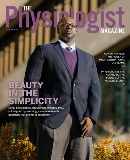Progressing to Postdoc
Tips on how best to transition from PhD to postdoc to faculty

Each issue we ask a trainee member to pose their career questions to an established investigator and mentor. Here, Luke Schwerdtfeger, a PhD student in the biomedical sciences program at Colorado State University in Fort Collins, asks Victor A. Convertino,
PhD, FAPS, senior scientist for combat casualty care and director of the Battlefield Health & Trauma Center for Human Integrated Physiology at the U.S. Army Institute of Surgical Research in Fort Sam Houston, Texas, about the transition from student
to postdoctoral researcher.
Q: I have heard from some that doing a postdoc with a more junior faculty (e.g., assistant professor) can be more difficult than with a more senior person. Do you find this to be true?
A: This is an important question because it will lay the foundation for the progression of your career. In an effort to avoid defining a “junior” versus “senior” faculty member, I prefer using the term “established
investigator.” For instance, during my career, I’ve seen senior faculty who had not established themselves as national and international leaders in their fields of research, while I’ve seen more junior investigators rise to prominent
recognition for being subject matter experts early in their careers. In this regard, it is most important to choose a postdoc mentor who has established herself or himself with adequate funding, a nationally recognized research program and laboratory,
regular publications in the scientific literature, and experience with mentoring other postdocs.
I recommend that you identify and talk with former postdocs as references for a candidate faculty member you are considering working with.
I remember the advice given to me by one of my mentors when I was considering postdoc positions: You want to work for a person who can pick up the telephone and recommend you for a job.
Q: Did you find the transition from graduate student to postdoc to be a difficult one? If so, do you have any strategies for managing the new stressors of being a postdoc?
A: My transition from graduate student to postdoc was rather easy because my equivalent postdoc position was a continuation of research working with the same, as well as new, scientists at the same institution responsible
for providing me with funding and mentoring during my doctoral work.
So, I was fortunate to “transition” to an established laboratory and research program that was well-funded and provided opportunities to publish and attend
professional meetings, allowing me to broaden my professional network.
However, it was my transition from a postdoc to my first faculty position that I found the stressors associated with being a young scientist to be more challenging,
but these were likely selfimposed. I recommend minimizing stress by choosing a postdoc position that involves conducting research in an area for which you have passion. Don’t settle! It is my experience that if you really like the research you’re
doing and the colleagues you’re doing it with, the
perception of stress will be minimal.
Q: Did you find time management and balancing life and work more difficult during your postdoc compared to graduate school?
A: Although the emphasis on studying and working were different, I did not find that managing my time in an effort to balance life and work was much different between postdoc and graduate school. Time management in our profession
is a challenge that can be met by developing a habit that builds in time for recharging from the stress of having a career in science. In addition to providing a break away from the intensity of research, I’ve found that being involved
in youth sports activities and regularly scheduled exercise—playing basketball, tennis, jogging—has helped me maintain balance with family and friends without compromising my professional commitments.
Got a career question you’d like to submit? Email it to education@physiology.org and we’ll consider it for an upcoming Mentoring Q&A.
This article was originally published in the January 2021 issue of The Physiologist Magazine
The Physiologist Magazine
Read the Latest Issue
Don’t miss out on the latest topics in science and research.
View the Issue Archive
Catch up on all the issues of The Physiologist Magazine.
Contact Us
For questions, comments or to share your story ideas, email us or call 301.634.7314.


